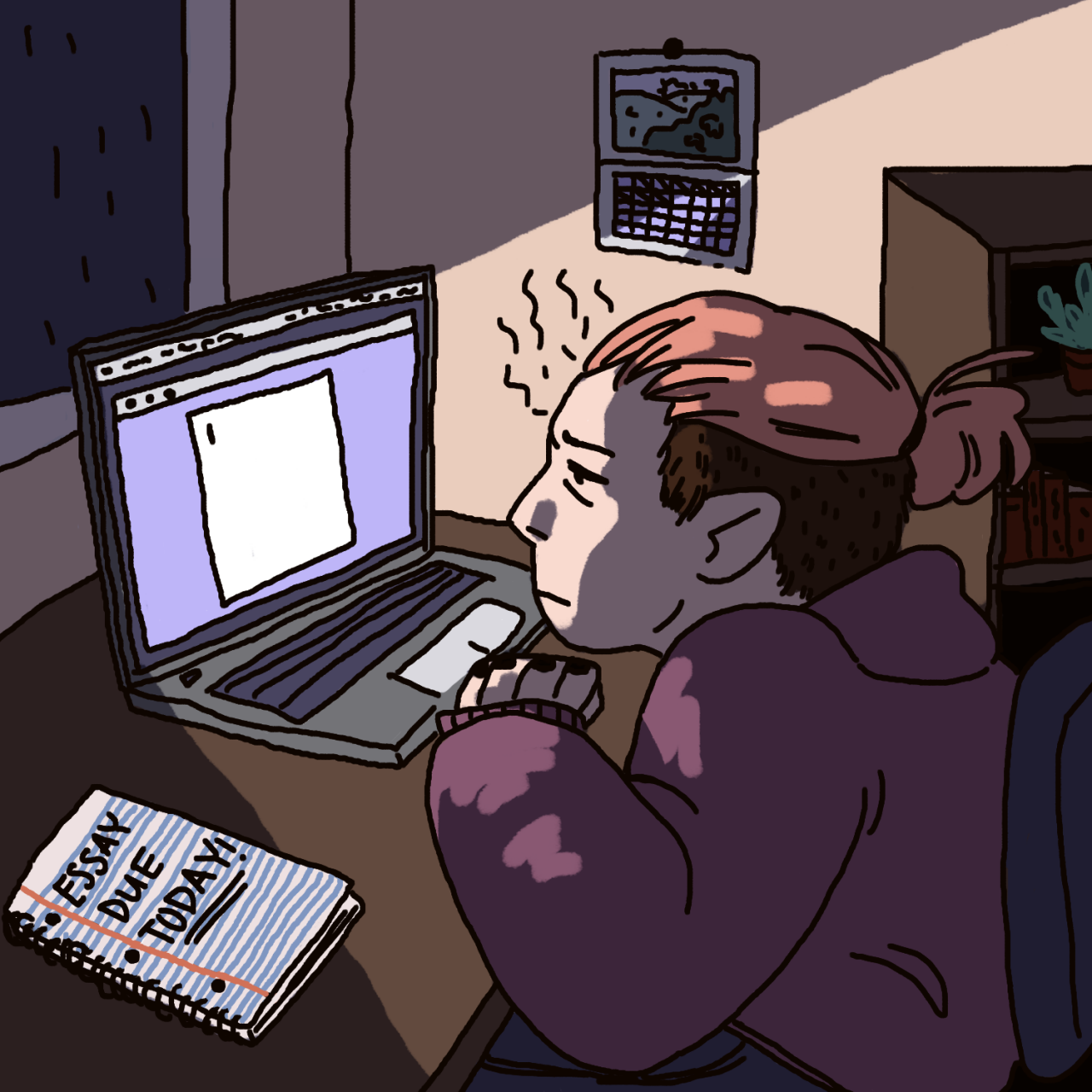Illustration by Ren Rader
I think that I used to actually enjoy writing once, maybe? Writing for fun, even. I remember being young, making up stories for personal enjoyment and even creating illustrations that went along with them. When I came to Trinity, for some reason I assumed that I would be an English major. (Yes, I was that kid in high school who cultivated a deep friendship with all of my English class teachers, thank you for asking.) When I decided that wasn’t the path for me, I assumed that writing would still be a major part of my life. But over this past year, I realized that something was different. I didn’t enjoy the process of writing as much as I had since … I don’t know when. (Which is deeply ironic for someone who has been a Trinitonian reporter for two years!)
It’s not that I didn’t enjoy thinking about the complex topics that I either was assigned for class or that I gave myself as projects to work on for the inevitable end-of-class essay assignment. But there was this underlying feeling of tension every time I decided, “OK, today I will write about how class and racial tensions are expressed in turn-of-the-century Gothic novels/consumerism and how it relates to messages of feminist (dis)empowerment in commercials/models for how food sustainability can function in post-scarcity anarchist societies/whatever idea I’ve latched onto and have immediately decided WILL feature in my future senior thesis … for the next two weeks.” This feeling of self-consciousness, as if I couldn’t write anything without worrying about how it would be graded and, more importantly, perceived by others? (Exhibit A: my current agonized state over whether this paragraph should end with a question mark or a period.)
This very much could be a product of my individual neuroses, as so much seems to be. But I think the feeling of not being able to write or do anything creative just for personal enjoyment, and feeling constrained by self-imposed and external judgment and perfectionism, might be more prevalent among Trinity students — and college students in general — than one would think, due to the conflicting messages we get about what the purpose of learning and education is. Creativity and self-care are emphasized at Trinity and similar private universities, but there’s also the prevailing pressure to do something that makes you stand out among your peers, to put on your applications for grad school, internships and/or your future career and to write things that are “polished,” conform to academic norms and have at least 10 to 15 cited sources. No, this pressure can’t be alleviated by therapy dogs in the library, despite the best of intentions.
This pressure to write well academically sometimes keeps me from writing anything at all (for class or just to sort out personal thoughts, etc.) because what if it’s not good? What if the paragraphs aren’t coherently ordered or I’m forgetting something important? To cite a sentence from Victoria Stringer’s excellent opinion column published in the Sept. 13 issue, “The general consensus at Trinity seems to be that life should begin and end with academics.” And academic curiosity is a wonderful thing that should be cultivated in and out of formal academic settings! But I would counter that an environment where we perceive a lack of freedom to create and write things that are, strictly speaking, not good or going to get As automatically, is actually detrimental to our academic and mental health.And academic curiosity is a wonderful thing, and should be cultivated in and out of formal academic settings! But I would counter that an environment where we perceive a lack of freedom to create and write things that are, strictly speaking, not good or going to get A’s automatically, is actually detrimental to our academic and mental health (and isn’t mental health, after all, deeply entwined with the content that we can produce?)
Not to be political in this independent student-run newspaper (I would NEVER!) but I think that we — referring in this case to not only Trinity students, but anyone interested in learning and education, which I would contend is everyone — can do better than an educational system that ties the incredibly nuanced process of learning to grades and grades to the inevitable process of credentials and degrees, income and an imagined reward later in life. For one thing, it’s hard to develop yourself fully as a person, to read the books that you’re interested in and to decide what makes you happy in life, when you feel pressured by the constraints of academics and writing things that are “well-written” within a specific time frame. While people say, “It’s OK to fail,” this well-meant sentiment is undercut by things like transcripts, where there are material consequences for not “doing well” in a particular class.What if “failure” wasn’t a concept in academic settings, and the expectation for learning wasn’t one of linearity and moving towards concrete goals that many students aren’t able to meet — sometimes because of different learning styles and challenges, sometimes because of burnout and over-scheduling and sometimes just due to the state of being a person and moving towards academic goals at a different pace?
Speaking of concrete goals, I don’t have any long-term solutions for our Trinity-induced writers’ blocks. However, there are small steps that you can take to reclaim the act of writing and creation for yourself, as opposed to for school and/or other people to view. I know it can be difficult, but maybe start by taking notes in a journal and not giving yourself the expectation of writing something meaningful or profound or good. It can be helpful to take 15 minutes of your time and just draw something or write a song, somewhere isolated where you can be mindful of yourself and your surroundings. Just remember: nothing you can do is “wrong.”






